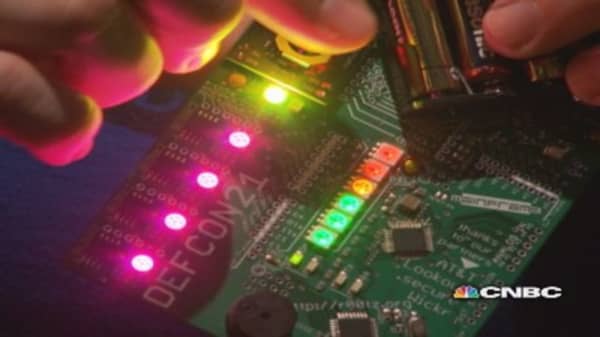Simaya Rosenbloom, 11, explained one activity.
"I'm trying to crack the code by going to page source, so I'm looking up the JavaScript and I'm trying to figure out which user I should go on," she said. "I haven't exactly figured that out yet, but I know the password is three letters or three characters."
Noah Hunt Glickman, 8, was happy his father took him to r00tz Asylum.
Meanwhile, his father, David Sutter Glickman, said, "It's like training-wheels for learning about the technology … having kids start sooner, getting people who wouldn't normally get into hacking sooner, and spreading that it's not necessarily hacking in the evil sense but a lot about curiosity, finding flaws and sharing knowledge."
Another important teaching tool this year was the kids and their parents' conference badges. James Arlen designed the badge with his daughter, Amelia.
"It's lots of LEDs, lots of processors networked, runs on batteries, has a speaker to annoy the parents, which can also extensively be used as a sensor. … Smart pixels, buttons, we have a track ball, just like a BlackBerry," he said.
In addition to the badge, the 175 kids enrolled received an Android tablet with a full application development environment.
"It isn't just that they could play with a toy that hangs around their neck," Arlen said. "It's a way to connect the virtual world and the real world."
The r00tz Asylum program provides kids a safe environment in which to break the rules, he said.
(Read more: Six charged in biggest credit card hack on record)
That's part of the reason that Arnold Rosenbloom, a professor at the University of Toronto, brought his daughters to participate.
"Learning it in a controlled kind of environment under guidance is much better than people going off on their own and perusing it in any way they please, he said. "The goal here is not to learn to hack. ... It's just awareness and reasoning skills and logic."
For the kids, the program can even help to inspire future career plans.
(Read more: US sharing classified information to stop hack attacks)
"When I'm older I want to become a white-hat hacker," said Tyrique Fantu. "Meaning I'll work for the government or ... for [companies] that want people to look for vulnerabilities in their system. ... So I find it, and here's how you can fix it."
—By Jennifer Schlesinger and Sabrina Korber






